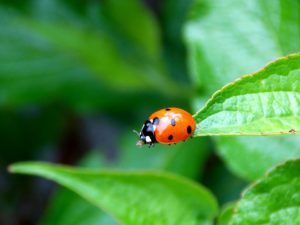
Attract beneficial bugs to your garden for natural pest control
Whether you’re growing crops to feed your family or planting flowers for a more aesthetically pleasing yard, it’s a good idea to keep sustainable landscaping in mind. This practice involves planning out your lawn or garden to minimize its potential negative environmental effects. For instance, there are a number of natural ways to maintain a healthy yard while also preventing pests from entering your garden, rather than using harsh chemical pesticides. It’s simple to do your part to protect the environment, starting in your own backyard.
Don’t Waste Water
Saving water in your yard and garden not only saves you money but also preserves a crucial natural resource. By planning out a water-efficient landscape, you can reduce your outdoor water use by up to 50 percent. One simple way to use less water naturally is to choose drought-tolerant plants for your yard, such as lavender, catmint, and coneflower. Mulching around plants can also cut down on water loss. And if you need to water your lawn or garden, do it in the early morning, when it’s cooler and more moisture will seep into the ground instead of evaporating into the air.
Attract Friendly Insects
Instead of relying on harmful pesticides and other lawn chemicals to keep “bad” bugs away, find natural ways to attract friendly insects. Good bugs can help keep the bad ones away to minimize damage to your garden. For example, damsel bugs eat aphids, thrips, small caterpillars, and other pesky insects. You can gather damsel bugs from a local alfalfa field and bring them to your garden. Other good bugs include the ladybug, spider, praying mantis, hover fly, aphidius wasp, and lacewing.
Try Companion Planting
Companion planting is the practice of planning how you arrange your garden so that plants placed next to each other can help each other to grow or protect one another from pests. Companion planting can lead to healthier plants, and it can also block weed growth, which reduces the need for chemical pesticides. Some plants also act as a natural insect repellent by confusing insects with strong odors that mask the scent of other plants. For example, planting basil and dill among tomatoes can help protect the tomato plants from hornworms.
Install Bird Feeders
Birds eat a variety of garden pests that destroy plants, such as grubs, snails, slugs, and caterpillars. By installing bird feeders or nesting boxes, you can encourage more birds to visit your yard, which can be highly beneficial to the health of your garden. For example, bluebirds feed on crickets, grasshoppers, larvae, and beetles, while cardinals eat leafhoppers, snails, and stinkbugs. In addition to having a bird feeder filled with a quality seed blend, provide a water source like a birdbath, preferably with a bubbler.
Build a Compost Pile
If you have yet to start a compost pile in your backyard, you may want to give the idea another look. Composting is an effective way to keep kitchen leftovers out of the landfill while also enriching the soil in your garden naturally. By using compost in your garden, you can drastically reduce or eliminate the need for chemical fertilizers. Composting can also improve soil texture, water retention, and drainage. You can compost many common household items, such as fruit and veggie scraps, coffee grounds, egg shells, tea bags, coffee filters, grass clippings, dry leaves, and even shredded newspapers.
